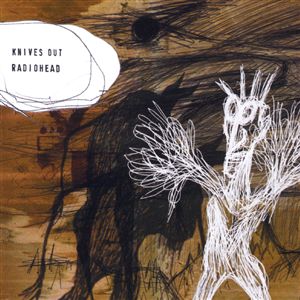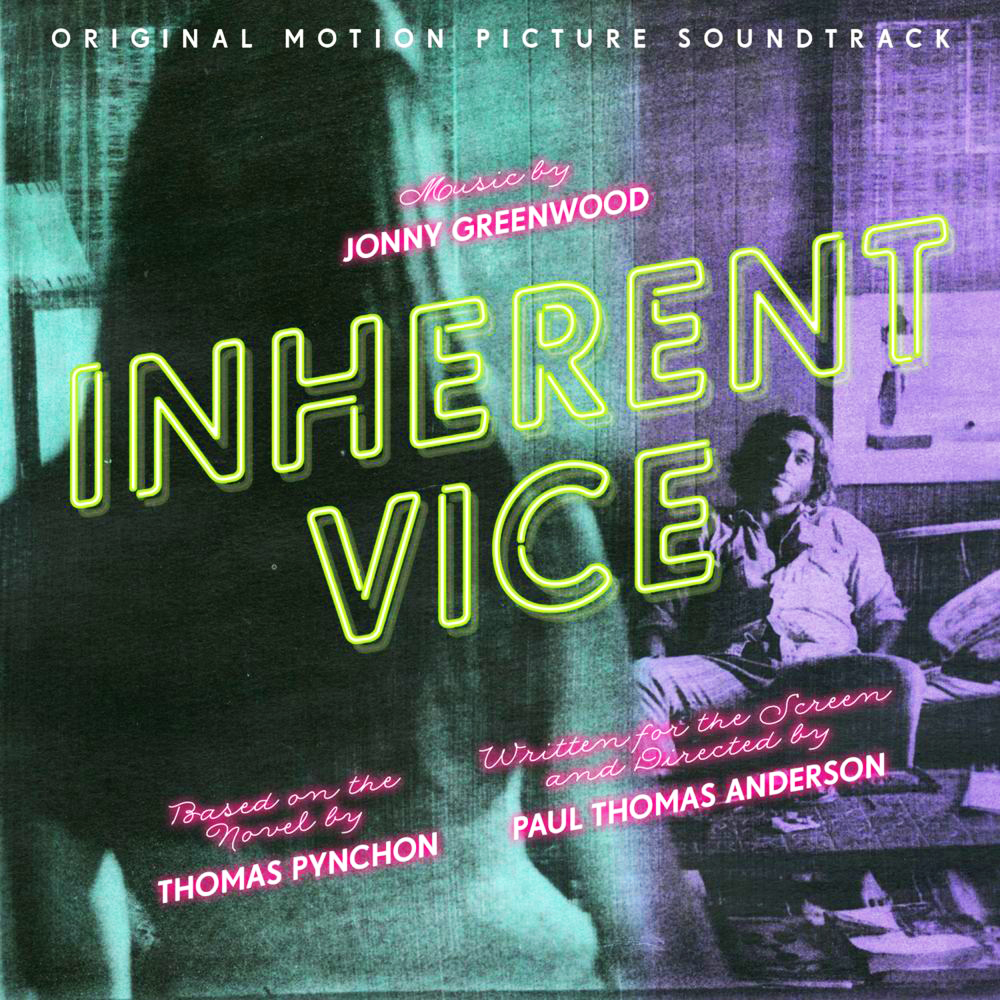Pynchon Music: Radiohead
W.A.S.T.E. Product
I just started “Gravity’s Rainbow.” I tried reading it once before, but this time around it’s much more fun… This one seems easier to get into than “V.”
—Thom Yorke
Radiohead (1985–Present)
Normally “Pynchon on Record” pages begin with an introduction to the artist, maybe a brief biography or general overview of their music. But this is Radiohead, one of the most popular and critically-acclaimed bands of the century, so you might’ve heard of them? Formed in Oxfordshire, led by enigmatic singer/songwriter Thom Yorke, changed contemporary music with albums so inventive some refer to them as “post-rock?” So we’ll let other resources do the heavy lifting in terms of Radiohead history and just stick with the band’s relationship to Pynchon.
Back when Spermatikos Logos was first launched in 1996, we received numerous letters claiming that Radiohead was influenced by the works of Thomas Pynchon. The main reason was the acronym that graced their mail-order merchandizing outlet: W.A.S.T.E.! Familiar to any reader of The Crying of Lot 49, “We Await Silent Tristero’s Empire” was the hopeful watchword of an underground postal system employed by paranoids, desperadoes, and lonely hearts. Or, apparently, fans ordering a Pablo Honey T-shirt.
An obvious Pynchon reference to be sure! And Lord knows we included bands for less. There was also this lyric from “Fake Plastic Trees,” one of the stronger tracks on Radiohead’s second album, The Bends: “He use to do surgery / On girls in the eighties / But gravity always wins.” Possibly a winking allusion to both V. and Gravity’s Rainbow?
Then one day we received a letter from one of Thom Yorke’s childhood friends, a fellow named John Butcher. Mr. Butcher confirmed our suspicions, and stated that Yorke was indeed a fan of Pynchon’s writing, including his famous 1984 essay, “Is It O.K. to Be a Luddite?” And certainly, many of the themes discussed by Pynchon in that essay are echoed in Radiohead’s 1997 masterpiece, OK Computer.
To insist on the miraculous is to deny to the machine at least some of its claims on us, to assert the limited wish that living things, earthly and otherwise, may on occasion become Bad and Big enough to take part in transcendent doings.
—Thomas Pynchon, “Is It O.K. to Be a Luddite?”
On July 9th, 2000, Radiohead premiered a new song at the Old Roman Amphitheatre in Caesaria, Israel. Returning alone to the stage for the first encore, Yorke sat down at the piano and announced the name of the song: “Alligators In the New York Sewers.” A moody, downtempo piece, it spoke of a house haunted by the specter of a child, possibly a metaphor for the singer’s innocence, destroyed or corrupted by some unnamed trauma.
With its surreal imagery of glowing fog and baby alligators, the song has a specific resonance for Pynchon fans, and calls to mind the passages in V. where Benny Profane hunts alligators through, well, the New York sewers. Of course, flushing baby alligators down the drain has been a New York tradition since the 1920s, so it’s possible Yorke’s inspiration was merely the same urban legend that sparked Pynchon. But—Pynchon fans do love connecting things, so there it is. A clear reference.
Many expected “Alligators In the New York Sewers” to appear on Radiohead’s next album, Kid A. But it wouldn’t see the light of day until Amnesiac, and even then, it was released as a B-side on the Knives Out single. (Radiohead’s B-sides are a cottage industry in themselves, and are often better than most group’s A-sides.) And unfortunately for Pynchon fans, the song was stripped of its V.-resonant title and simply renamed “Fog.”
In 2008 Radiohead released their seventh studio album, In Rainbows. (As a Pynchon character might say: oboy oboy!) Rolling Stone interviewed the band and put Thom Yorke on the cover. Four years later, King of Limbs was released, and Radiohead was again granted a cover interview. Shortly thereafter Rolling Stone published an online “listicle” about Radiohead’s “secret” influences, using quotes culled from previous cover interviews. Along with musical artists such as the Smiths and Fleetwood Mac, Thomas Pynchon was included, with Thom Yorke quoted as saying: “I just started Gravity’s Rainbow. I tried reading it once before, but this time around it’s much more fun. It’s a really early one, isn’t it? This one seems easier to get into than V.” Neither the date nor the source of the quote was offered—nor the reason why Yorke thought Gravity’s Rainbow was written before V.—and a search fails to find the quote in any other Rolling Stone interview. So it’s probably an outtake; after all, only a fraction of most interviews are actually published, especially when the reporter hangs out with the musicians for a day or two. However, Radiohead blogger Weird Fishee believes the quote came from the 2008 interview. If this is true, it’s hard not to see the title of In Rainbows as another oblique Pynchon reference—but again, it’s also hard not to hear the Paranoids singing…
Jonny Greenwood
The final Radiohead/Pynchon connection is a good deal more concrete! Radiohead guitarist Jonny Greenwood is also a composer, and has developed a booming side career writing soundtracks. Having scored two of Paul Thomas Anderson’s previous films—the amazing There Will Be Blood and the L.-Ron-Hubbardesque The Master—Greenwood composed the soundtrack for Inherent Vice, Anderson’s 2014 film based on Pynchon’s seventh novel. While it’s likely that Anderson would have asked Greenwood to continue their creative partnership regardless, the fact that Greenwood plays in a band all but sporting a post-horn probably didn’t hurt. What’s even more surprising is the score itself, which forsakes Greenwood’s usual feedback and dissonance for an old-school lyricism many reviewers found surprisingly “romantic.”
Lyrics
“Fog”
Running around this house
And he never leaves
He will never leave
And the fog comes up from the sewers
And glows in the dark
Baby alligators in the sewers grow up fast
Grow up fast
Anything you want, it can be done how?
How did you go bad?
Did you go bad?
Did you go bad?
Somethings will never wash away
Did you go bad?
Did you go bad?
Additional Information
Radiohead
Parlophone / Capitol / Toshiba-EMI, 2001
Note: In the irritating way of CD-singles, there are numerous permutations of Knives Out. The track listing below represents the only “complete” version, Japanese CD single TOCP-65871
2. Cuttooth (5:25)
3. Worrywort (4:37)
4. Fog (4:05)
5. Life In a Glasshouse (full length version) (5:06)
Thom Yorke—vocals, guitar, keyboards.
Jonny Greenwood—lead guitar, keyboards.
Colin Greenwood—bass.
Ed O’Brien—guitar.
Philip Selway—drums.
2. Vitamin C [Can] (3:32)
3. Meeting Crocker Fenway (1:25)
4. Here Comes the Ho-Dads [The Marketts] (2:10)
5. Spooks (2:35)
6. Shasta Fay (7:02)
7. Les Fleurs [Minnie Riperton] (3:15)
8. The Chryskylodon Institute (3:04)
9. Sukiyaki [Kyu Sakamoto] (3:06)
10. Adrian Prussia (2:51)
11. Journey Through the Past [Neil Young] (2:22)
12. Simba [Les Baxter] (2:42)
13. Under the Paving-Stones, the Beach! (1:56)
14. The Golden Fang (4:50)
15. Amethyst (2:03)
16. Shasta Fay Hepworth (5:45)
17. Any Day Now [Chuck Jackson] (3:24)
Inherent Vice Soundtrack
Pynchon on Record
Return to the main music page
Last Modified: 12 November 2021
Back to: Pynchon on Record
Main Pynchon Page: Spermatikos Logos
Contact: quail(at)shipwrecklibrary(dot)com




